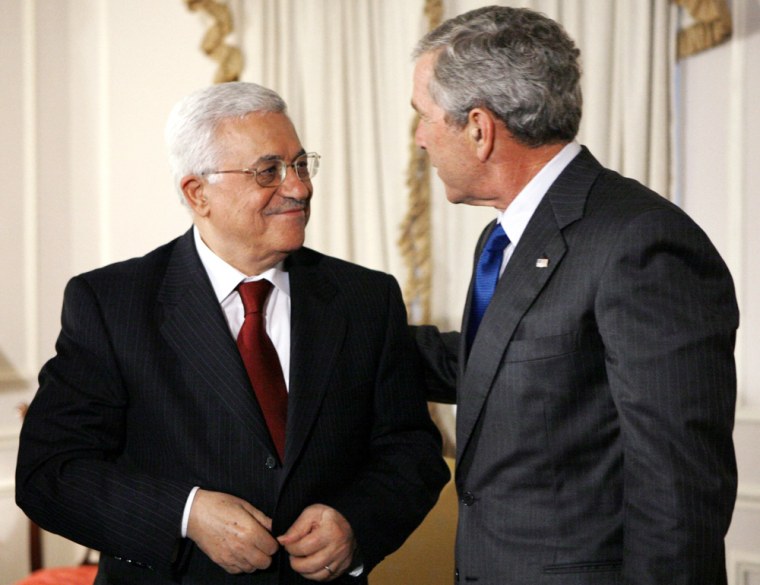President Bush tried to boost Palestinian leader Mahmoud Abbas Wednesday as "a man of peace" who can help advance Mideast talks that have been stalled with militant Hamas leaders controlling the Palestinian parliament.
Abbas told Bush, "We are in dire need of your help and support."
He assured Bush that Palestinians want peace, despite the election of Hamas, which is sworn to Israel's destruction and has rebuffed international demands to recognize Israel and renounce violence.
'Coexisting in peace'
"The Palestinian people desire peace, and there is no power on Earth that can prevent the Palestinian people from moving toward the peaceful solution and living and coexisting in peace," he said.
The meeting came while the two leaders were in New York to attend the U.N. General Assembly. In a speech there Tuesday, Bush said achieving peace in the Middle East was one of the great objectives of his presidency.
"I fully understand that in order to achieve this vision there must be leaders willing to speak out and act on behalf of people who yearn for peace," Bush said at the end of his meeting with Abbas when reporters were invited in. "And you are such a leader, Mr. President."
Hope for progress
The two leaders spoke briefly to the media and did not take questions.
During the 40-minute meeting, deputy national security adviser Elliott Abrams said that Bush commended Abbas for his efforts to find a way out of the difficult political situation now that the Palestinian government has no international legitimacy. Bush expressed hopes that progress can be made in talks between Abbas and Israel Prime Minister Ehud Olmert, he said.
"The president is really committed to trying to achieve this," Abrams said. "He's well aware of the fact that conditions may, in the end, do not exist to make it possible.
"But he wants it understood that his interest, his commitment, his view that the establishment of a peaceful democratic Palestinian state is very, very much in the interests of Palestinians and Israelis alike."
The U.N. Security Council plans an open meeting Thursday that is intended to revive the peace process.
Four challenges
In his talk Tuesday, Bush challenged Hamas to reject terrorism, recognize Israel's right to exist, honor existing agreements and work for peace.
Hamas is sworn to Israel's destruction. Abbas has been trying to persuade Hamas leaders to moderate their anti-Israel policies and join with his Fatah Party in a coalition government.
U.S. officials have been concerned that Abbas has not shown greater leadership, while Fatah leaders complain that the United States has done next to nothing to support Abbas.
After the Hamas-led Cabinet took office in late March, the United States and European Union, the two biggest donors to the Palestinian Authority, cut off hundreds of millions of dollars in aid. Abbas wants to resolve the political stalemate in hopes of restarting the flow, but discussions have stalled over the U.S. demand that Hamas fully renounce violence, recognize Israel and agree to abide by commitments made by the previous secular Palestinian leaders.
Abbas meetings
Abrams said Abbas did not directly ask Bush for more aid.
Abbas met Monday in New York with Israeli Foreign Minister Tzipi Livni, the first working session between high-ranking Israeli and Palestinian officials in four months. Afterward, Livni said Israel wants to reopen a serious dialogue with Abbas and work with him to establish a Palestinian state.
The U.S.-backed peace plan aimed to establish a Palestinian state by 2005, but Israel and the Palestinians have failed to carry out their obligations and it has languished.
The efforts for peace were further set back this summer after militants allied with Hamas tunneled from the Gaza Strip into Israel to kidnap an Israeli soldier. The attack, which came after Israel withdrew last year from the Gaza Strip, sparked a large military offensive in the Palestinian area in which more than 200 Palestinians have been killed, most of them militants.
Days later, Hezbollah guerrillas abducted two soldiers in northern Israel and killed three others, triggering a larger assault across the border into Lebanon that lasted a month.
Bush returned to Washington after his meeting with Abbas.
